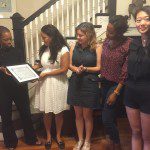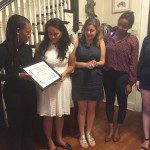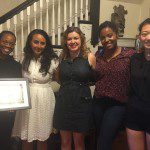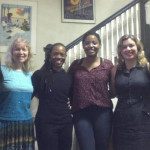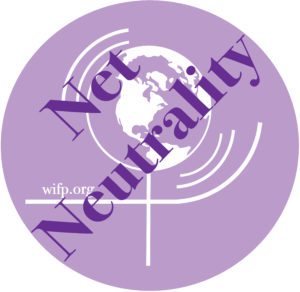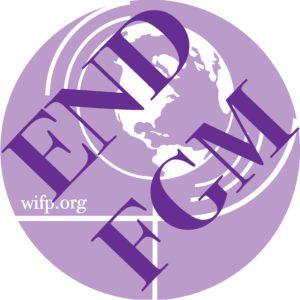Women’s Voices and the Media
Speakers at our program “Women’s Voices and the Media,” July 1, 2016:


Martha Allen
Director of WIFP
Welcome and Introduction
Natasha Mirza
Understanding Rape Culture
The term “Rape Culture” is a popular buzzword today for political pundits and online commentators alike. Rape Culture affects every facet of the society we live in, from our television and film industry to our legislative and judicial processes. However, it is poorly understood and often misinterpreted as an empty and deliberately provocative phrase. In order to truly combat the toxic effects of a Rape Culture society we must first understa
nd its impact.
Bio: Natasha Mirza is a 21 year old student at the University of Virginia. Born in London, England, she completed her Associates at Northern Virginia Community College with an Honors degree in Liberal Arts. She is a rising fourth year student at UVA where she majors in English and she plans to continue working on behalf of the Minority Rights Coalition as a contributor to the
school newspaper “The Cavalier Daily”. She hopes to pursue a career in women’s rights advocacy and international journalism.
_____
Majd al Waheidi
Beyond the Struggle
Women in Gaza have never had an easy life but the summer war in 2014 has made the situation even worse. The news usually say most of those who died in wars are women and children, but we do not hear their individual stories. Today Majd al Waheidi will introduce us to the real lives of women in this area.

Bio: Majd al Waheidi is the New York Time’s Gaza based reporter, and regularly breaks important and exclusive stories. She also works as a freelance correspondent for Channel News Asia that broadcasts from Singapore. She works hard to and human interest stories in a place that struggles from siege and constant hardships and opinions that are fed more by propaganda than reliable information. Like most of the people in Gaza, she is the descendant of refugees, but likes to define herself as a global nomad. Majd has lived through three wars in the last 6 years, and covered the last one, known as Operation Protective Edge, in 2014 for several international TV channels.
_____
Lucy Lu
The Lack of Women’s Representation in Politics and How to Improve It
In 2016 women across most developed and developing countries remain signifi- cantly underrepresented in politics both as voters and as leaders. Women constitute half of the world’s population  and therefore it is crucial that they have equal participation and representation in world democracies.
and therefore it is crucial that they have equal participation and representation in world democracies.
Bio: Lucy Lu is a rising junior majoring in Political Science and minoring in Sociology and Studio Art at Marist College. She grew up in Beijing, China then moved to New York for school. She has also studied in Florence, Italy for a year. Lucy is passionate about social issues especially those regarding human rights and social justice. She hopes to pursue a future career in international relations.
_____
Briawna Gillespie
The Voice Behind the Tag
Fashion is something that we are all consumed by and play a role in. However, when it comes to knowing The Voice Behind the Tag we as consumers are not very aware. Women in the garment industry in Bangladesh are being killed and not being heard. It is time to see how media can bring their stories to light to change the consumer world so that these women’s voices are not devalued.
are being killed and not being heard. It is time to see how media can bring their stories to light to change the consumer world so that these women’s voices are not devalued.
Bio: Briawna is a current graduate student at the University of San Francisco studying International Studies/Relations. Bri has a bachelor’s degree from Bowling Green State University in International Studies with a minor in Theatre. She has also lived/studied in France and speaks French. Originally from Chicago, Illinois, Bri hopes to continue to travel, learn and be inspired by the world and hopes to pursue a career in Human Rights Law.
_____
Angela Sisson
The Resurgence of Self-Publishing in Print Media
In the past few years the influence of print media has been reemerging in a society that is nearly exclusively digital. Marginilized communities (young women in particular) have been using  print media and self-publishing to promote their own voices by employing a sense of gravitas that is often
print media and self-publishing to promote their own voices by employing a sense of gravitas that is often
lacking in online spaces.
Bio: Angelica Sisson is a rising senior at the Catholic University of America in Washington D.C. studying Greek, Latin, and Philosophy. She is the news editor and copy editor for her university’s paper as well as the head copy editor for her school’s undergraduate research journal.
_____
Anna Gabar
The Effects of a Conflict on the Gender Roles in the Society
Israeli society has been dealing with many issues because of its long term involvement in a violent conflict. This conflict shapes many social norms, one of which is the gender roles in the society. Israeli women serve in the military making them equal to men in many ways, but on the other hand, the dynamic that is created there is still very much gendered. 
Bio: Anna Garbar is a 25-year-old Israeli student in her final year of her B.A. in Political Science and Philosophy at the University of Haifa. She is passionate about politics, and specically international relations. In her opinion, the field of International Relation is starving for a feminist perspective. It has been a male dominated field for far too long. Her interest in women’s voices in conflicts comes from her connection to the Israeli Palestinian conflict. Being an Israeli, it is important to her to stress that a solution can come from raising the voices of women who are affected by it, since a real change has to be done both from bottom to top as well as from top to bottom.


Soraya Chemaly receives 2016 Women and Media Award
The Women’s Institute for Freedom of the Press presented the 2016 Women and Media Award to Soraya Chemaly, a writer and activist focused on the role of gender in culture, politics, religion, and media.

WIFP staff gathered for the ceremony June 23 and in preparation the day before. Sharing the excitement: Elana Anderson (presenting the Award), Martha Allen, Briawna Gillespie, Angelica Sisson, Lucy Lu, Batya Marcus, and Tanya Smith-Sreen.
In the summer of 2015 Soraya gave a TED talk at the Barcelona Women conference. She presented “The Credibility Gap: How Sexism Shapes Human Knowledge.” At this talk she discussed an article she wrote concerning how gender is addressed in public spaces, specifically how men’s bathrooms are larger than women’s even though women routinely need the bathroom more and for longer periods of time (due to breastfeeding, periods, etc.). She said this article, written for TIME and called, “The Everyday Sexism of Women Waiting in Public Toilet Lines” is the one for which she has received the most backlash and verbal abuse. This was shocking to her because many of her other articles contain stories of violent gender-based crimes often of a sexual nature, yet it was an article about how women deserve larger public restrooms that was the cause of public outcry.
to her because many of her other articles contain stories of violent gender-based crimes often of a sexual nature, yet it was an article about how women deserve larger public restrooms that was the cause of public outcry.
Recently, Soraya has written about the role gender plays in the ongoing 2016 Presidential Election. At a rally in Spokane, Washington Donald Trump said Democratic Presidential Nominee Hillary Clinton is “playing the woman card.” In response, Soraya wrote the article “How Ted Cruz, Bernie Sanders, and Other Men Play the Gender Card” where she explained how men constantly bring their gender to the front of their campaigns. She said by being recognized first and foremost for their political ideals and not having to discuss their gender these candidates are themselves playing the male card.
Another powerful article Soraya published in May 2016 on The Huffington Post’s website deals specifically with the Washington D.C. Metro Area. In the article, “D.C. Metro Rape Highlights Why Women Are Always Aware of Rape,” she discusses how threats of sexual assault, harassment, and stalking are prevalent to women in the Metro area and to women who use public transit across the world. Soraya encapsulates the threats women face on public transit, writing:
We aren’t walking around petrified, saying to ourselves, “I could get raped today,” eagerly anticipating having legendary victimhood status, but by the time we are adults, at school, going to work, shopping for food, we have all been taught to adapt silently to the threat, and society’s leveraging of that threat to limit our public and civic engagement.
Through her many articles and presentations Soraya has shown time and time again that she is an eloquent speaker and a thoughtful researcher, able to pinpoint and comment on the problematic parts of gender treatment and expression in today’s society with accuracy and considerate judgment. In 2013, she won the Association for Education in Journalism and Mass Communication’s (AEJMC)’s Donna Allen Award for Feminist Advocacy and the Secular Woman Feminist Activism Award. Now Soraya has been awarded the 2016 Women and Media Award from the Women’s Institute for Freedom of the Press.
Currently, Soraya is the Director of the Women’s Media Center Speech Project and the organizer of the Safety and Free Speech Coalition. She has written for The Huffington Post, The Feminist Wire, The Guardian, TIME Magazine, The Atlantic, Rolling Stone Magazine, and other assorted newspapers and magazines. Soraya serves on the boards of multiple organizations including: Women, Action and The Media, In This Together Media, No Bully, and the Women’s Media Center.
~ by Angelica Sisson, WIFP
Invitation to join us July 1 and the program.
Join us Friday, July 1, for an evening of presentations on topics including the resurgence of self-published zines by young women; exploring women’s voices in media in Bangladesh’s garment industry; understanding rape culture; how accounts of war are gendered; women in Gaza; and lack of female representation in global politics in relation to mass media. Refreshments provided and discussion to follow.
WIFP, 1940 Calvert Street, NW, Washington, DC 20009-1502.

An exciting program! (click for a pdf version of our program)
Weaving Our Way: Personal Stories of Identity
Another WIFP booklet!
Introduction
When discussing some of our life experiences in the WIFP office one day, we got onto the topic of identity. Then and there, the four of us decided to write essays about how we each currently view our own identities to share with each other and with others interested in this topic. We talked about putting together a book- let and invited a few others on the WIFP sta to join us in this endeavor.
view our own identities to share with each other and with others interested in this topic. We talked about putting together a book- let and invited a few others on the WIFP sta to join us in this endeavor.
It was clear that there are many aspects to identity. Not all are predetermined. We may be born in a particular country, live in various countries, be raised in a speci c culture, be exposed to and in uenced by other cultures, have a gender as- signed to us at birth that ts us or not, dis
cover our sexual orientation is accepted by society or not, come from a racial line of people that have a shared history or characteristics that others respond to in various ways. Some facets we choose to give meaning to while others are automatically given to us by the world around us.
Some aspects of our identity may change over time as our life experiences impact us. We weave our di erent experiences and perspectives into many varied yet intrinsically intertwined identities.
Hearing other stories of identity can broaden and enrich our own. It can create deeper understanding of the experiences and challenges of others. We can be empowered by the stories we hear and subsequently the stories we tell. May the stories we share here serve to encourage you to speak and write about how you weave together the aspects of the identity that you hold dear.
To read this booklet:
Click here for PDF of Weaving Our Way
Presentation and Discussion on FGM
Female Genital Mutilation (FGM): New Efforts in the Campaign for Eradication
by Elana Denise Anderson, PhD
WIFP Associate Director
In a world where war has become a common occurrence with its victims hailing from every walk of life, it is easy to dismiss what some may think of as a “culturally relative” practice as less important than the wars that are deemed “necessary” by mainstream corporate media entities. The war against women’s bodies that continues to be waged mercilessly finds fodder in the form of female genital mutilation, sometimes referred to as “cutting”. While semantics often play a significant part in propagandist efforts to shift the focus away from the heinous nature of this continued practice, there is nothing that can lessen the horrific impact that it has on the bodies and psyches of women and girls upon whom it is visited.
On February 14, 2016, the Women’s Institute for the Freedom of the Press and Global Woman Peace Foundation hosted a lecture by the renowned Tobe Levin von Gleichen, CEO of UNCut/Voices Press. The primary focus of Dr. Levin’s lecture was on efforts to raise awareness of female genital mutilation through both activism and education. Her talk was both informative and engaging; it included highlights of the workshop “Contestations around FGM: Activism and the Academy” held on March 7, 2015 at the University of Oxford, as well as film clips of “The Cruel Cut”, a documentary by Leyla Hussein, herself a victim of FGM. Dr. Levin has begun a new initiative that is designed to gather experts around the topic, that it may find place in higher education with regards to research, teaching and advocacy. Publications by UNCut/Voices Press were available at the event.
Those present included Global Woman’s Amie E. Jallah and Arielle Buchmann; WIFP’s Martha Allen, Elana Anderson, Tanya Smith-Sreen and Jonathan Zeitlin; Casey Carter Swegman and Dina Baky of the Tahirih Justice Center; Stephanie Black of She’s the First (American University), and Destiny Casson of Howard University, and others. As each organization gave a brief overview of their efforts in the campaign to eradicate FGM, it became more and more evident that this is a war that can be won and must be won. The lives of future generations of women depend on it. Let us come together to stop this-NOW!
Informal discussions continued after the event:
Some of the participants gathered together afterwards for a photo:
Participating Organization Links:
UnCut/Voices Press: http://uncutvoices.com and https://uncutvoices.wordpress.com
Global Woman PEACE Foundation: http://globalwomanpeacefoundation.org
Tahirih Justice Center: http://www.tahirih.org
Women’s Institute for Freedom of the Press: https://www.wifp.org
A few other Resource Links:
Leyla Hussein’s documentary The Cruel Cut: http://leylahussein.com/the-cruel-cut/
UN: http://www.unfpa.org/female-genital-mutilation and http://www.un.org/womenwatch/daw/csw/csw52/statements_missions/Interagency_Statement_on_Eliminating_FGM.pdf
Equality Now: http://www.equalitynow.org/fgm
 The Women’s Institute for Freedom of the Press
The Women’s Institute for Freedom of the Press